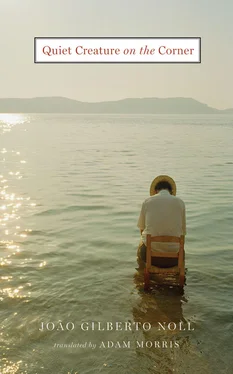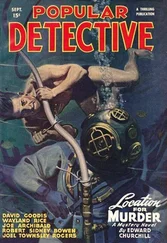She remembered how as soon as they met they came back to Brazil — Gerda’s father owned the land where they still lived today, they’d built a house there, married, but children never came, and what she had inside herself began to hurt, like a land that was cultivated in her mind but would remain always and forever unknown.
No, I said, not an always and forever unknown country, I answered, as a way to prevent Gerda from succumbing to a memory that seemed to be making things worse, since, at the moment she said the words always and forever unknown country , I perceived — right when in the middle of it she had given a long pause and gasped — it was just then that everything started to seem very serious, even though she was able to keep going and continued to hold my hand all by herself, she was even pulling my hand, yes, such that I was being pulled, dragged out of myself, lying on top of her body as I was doing now and devouring her, and when she said my God, a spasm, in a flash her body slackened, wilted, paralyzed, but not mine, mine was still going, and then came to the climax with a heaving gasp, to the point of evanescing over that woman who was no longer reacting, a stone.
It took me a while to untangle myself from Gerda’s inert arms. I didn’t feel the need to close her eyes, went into the bathroom.
As I urinated, trying to focus on and destroy a small fleck of filth that seemed to be crusted onto the white porcelain of the toilet, a nurse came into the room and announced that she was going to give Gerda an injection, and that with this dose she’d be in sufficient condition to get on a plane to Germany in a few days.
I went to the door of the bathroom, still zipping my fly. The nurse gave a few hysterical little laughs with the stuff for the injection in her hand, and started to tell me that Gerda was recovering all her functions nicely: she was going to the bathroom religiously at bedtime, after her dinner had settled, and no longer felt pain during her bowel movements.
She won’t be having any more bowel movements, I told her. Huh? the nurse probed. Look, I said, pointing to Gerda’s body.
I lifted Gerda’s hand, raised my index finger to her wrist, and her pulse beat twice, three times. I released her hand somewhat brusquely, stepped away. The nurse explained that this response from a dead body could last for a few hours. I asked her to close Gerda’s eyes, I’d already had enough of that still-warm death.
The nurse went out, I went to the window. The sun was trying to come out. In the vacant lot out front were five ragamuffin drifters, all of them standing with expectant posture, staring insistently at me. What did they want from me? I wondered, and lowered the blinds.
I picked up the phone and dialed the number of the hotel. She died, I said to Kurt. He said he’d come over later.
Nearby, a flock of birds started to sing. I lay down on the sofa, closed my eyes.
I opened my eyes, guessing the steps in the hallway were Kurt’s. This at least I recognized, Kurt’s gait. Before he opened the door I got up and went over to Gerda’s body. Kurt came close. He said he’d already brought our bags, he’d left them with the hospital doorman.
Only then did I notice that Gerda was ready, dressed in a gray skirt suit and white blouse, her half-open mouth lipsticked a pale pink, cotton in her nostrils.
I thought: how long will the funeral last? Through the slits in the blinds, I could see it was a clear day.
I looked at Kurt, but there was nothing to read on his face but fatigue. I turned my eyes back to the bright slits in the blinds and couldn’t stop thinking about the trip to Germany, certain to be canceled now.
We’ll take the body to Porto Alegre this morning, Kurt said.
And a horrible alarm clock began to go off inside the closet. As Kurt opened the closet the alarm shut off.
A shot in the yard out front. That was the first line of a poem I wrote in its entirety on the spot. I kept the poem in my head all the way to the airport. When we got there, I sat down at a lunch counter and copied it onto a paper napkin. It was the last poem I wrote. After that I never wrote another poem again.
But for the time being I was still standing there, composing the poem, the words coming in streams, in front of me was Gerda’s body, and just beyond was Kurt, standing to face me. He was staring at me. A shot in the yard out front / A hardened fingernail scraping the tepid earth — that’s how the poem continued, and to remember it I’d kept repeating it in my head line by line while I waited until it was time to escape that foul-smelling hospital room.
Gerda’s casket was put in a special car, half-chromed — Kurt and I were in front of the hospital waiting for a taxi to take us to the airport. We wouldn’t see the casket again until Porto Alegre.
When Kurt bent down to get into the taxi, I had an urge to help him but I stopped, as though preferring to closely watch what I was seeing: this man had really aged beyond his years, he was getting into the taxi with such difficulty that it left my mouth agape, thinking about how unprepared I was to track the passage of time.
It’s that Kurt had practically turned into an old man — and I, if I stopped to take note, would no doubt find myself a man and not the boy that Kurt pulled out of jail.
A period had passed since the day Kurt brought me to be with him, and now there was no denying it: this period had been longer than I had supposed.
And I wondered, a wave of goosebumps passing over the flesh of my scalp: Why this lapse in recognizing such a duration?
In any case, if I managed somehow to cure this lapse, if my memory ran backward to reconstruct this time, who would be able to evaluate its accuracy?
Something happened, I said to myself, and the secret seems to have been lost inside me, or maybe there, inside Kurt, a man unshaken by tears or any sort of commotion. And there he was, sitting in the backseat of the taxi, waiting for me to get in and remain beside his infinite dryness until we got to the airport, then from one airport to another, and from there to the manor for who knows how many more years, and from the manor, finally, to the edge of a hole — certainly the same as Gerda’s.
I sat beside Kurt. Gerda’s casket had already gone on ahead — it would obviously get crammed deep into the entrails of the airplane so that none of the passengers would see it.
As the taxi drove along Guanabara Bay, Kurt raised his hand in a tremulous gesture, and recalled that, years ago, he had come to Rio on business by himself a few times, in those days he stayed at the Copacabana Palace, he had an old friend who lived in Rio, younger than him, heir to a large fortune, who later died of leukemia — at the mention of the friend’s death I looked over at Kurt, he was taking pains to hold his gaze, looking out over Guanabara Bay — this friend had taken him for nights out on the town in Rio, in his company Kurt had even drank cachaça, until then he’d never tasted it, but it wasn’t pure cachaça, it was mixed with Coke, and this mixture was called samba-in-Berlin, samba-in-Berlin was what we ordered in the good old days, Kurt was saying carefully, without registering any emotion, the strange thing was that he started repeating the story of his trips to Rio: the friend, heir to a solid fortune, the two of them in the arbor at the Copacabana Palace, a world-famous actress whose name he’d now forgotten surrounded by photographers, and the story would stop when he got to that mixture of cachaça and Coke, the samba-in-Berlin, then he started over, repeating what he’d said before — those trips to Rio, the heir friend — always adding a detail or two, the late afternoon on the beach at Urca, the window of his hotel room facing the beach, and of course, topping it all off was the samba-in-Berlin — three, four, five times, as though he were trying to illuminate a point that kept escaping him, making it necessary to start all over again, two, three more times, and so on, until we arrived at Galeão airport and Kurt finally stanched the flow of his memories. His last phrase:
Читать дальше



![Quiet Billie - The Fastest Man Alive [СИ]](/books/421969/quiet-billie-the-fastest-man-alive-si-thumb.webp)
![Quiet Billie - The Promise Land [СИ]](/books/421970/quiet-billie-the-promise-land-si-thumb.webp)







